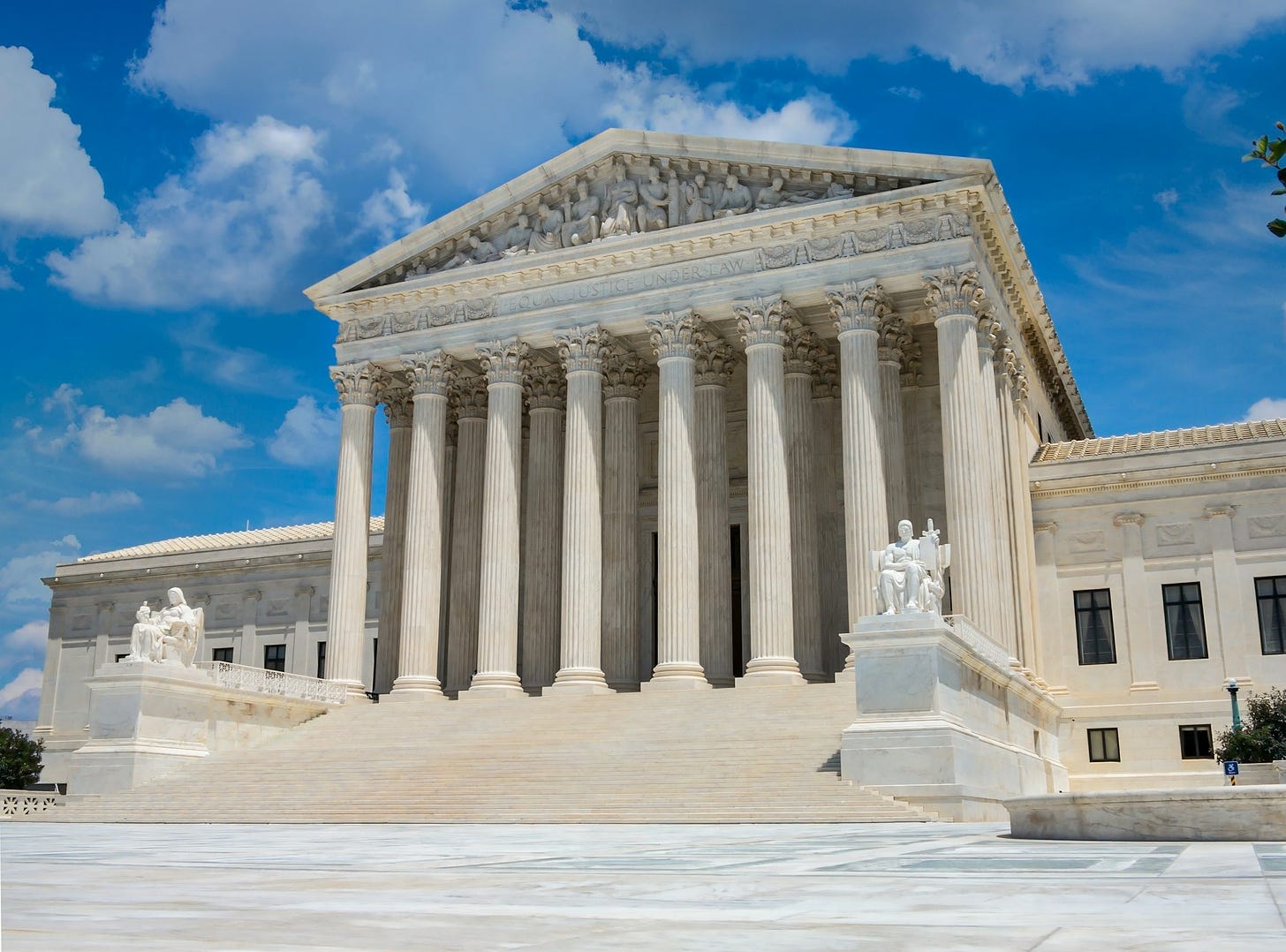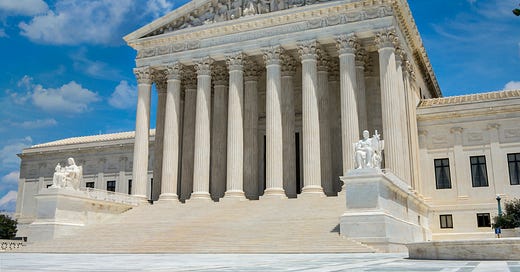Biden's Supreme Court reform proposals
Are President Biden’s proposed Supreme Court reforms good ideas? Viewpoints from multiple sides.

Enjoying Framechange? Support our growth by sharing the link to this edition with a friend.
New to Framechange? Sign up for free to see multiple sides in your inbox.
Learn more about our mission to reduce polarization and approach here.
What’s happening
On Monday, President Biden proposed a series of significant Supreme Court reforms. Biden argued the reforms, which he outlined in a Washington Post op-ed, are needed to “restore trust” to the Court after its recent “scandals” and “dangerous and extreme decisions.” Vice President and presumed Democratic presidential nominee Kamala Harris has endorsed the proposals.
Biden’s proposals are threefold:
1. Term limits for Supreme Court justices: Biden proposes an 18-year term limit for Supreme Court justices. Under the proposal, the sitting president would nominate one justice every two years while in office. Currently, Supreme Court Justices serve life tenures and are replaced through presidential nomination when one retires, passes away, or is impeached.
Over the course of the past few regimes, President Biden has nominated one confirmed justice, Donald Trump nominated 3, and Barack Obama nominated two (his third nomination was blocked by the Senate).
Biden did not specify whether sitting Supreme Court justices would be “grandfathered in” to serve out the remainder of their life tenures or be removed once they reach 18 years.
2. Binding code of ethics and conduct: Biden proposes an enforceable code of ethics that would require Supreme Court justices to “to disclose gifts, refrain from public political activity, and recuse themselves from cases in which they or their spouses have financial or other conflicts of interest.” Currently, Supreme Court justices self-enforce a similar code of ethics adopted in Nov 2023, which Biden calls “weak.”
3. “No One Is Above The Law Amendment”: Biden calls for a constitutional amendment that specifies no president is immune from prosecution for criminal acts conducted while in office. He specifically references the Supreme Court’s Jul 1 Trump v. United States (2024) decision granting presidents some immunity as a dangerous expansion of presidential powers.
Observers highlight that, given congressional gridlock and the difficulties of passing constitutional amendments, none of Biden’s proposals are likely to pass anytime soon.
The proposals have ignited debate over the necessity of Supreme Court reform more broadly and the merits of Biden’s specific ideas. This week, we bring you the viewpoints from multiple sides with a focus on his term limit and code of ethics proposals. Let us know what you think.
Notable viewpoints
More supportive of Biden’s proposals:
Term limits on Supreme Court justices would be an effective reform.
Term limits are a good idea because they help prevent justices from staying in power when they become physically or mentally unfit to do the job, discourage strategically-timed retirements by justices to retain an influence on their successor selection, and dissuade presidents from selecting younger and less qualified justices to project party influence deep into the future.
Term limits would prevent the imbalance resulting from situations where one president gets to nominate many justices while others nominate very few or none.
“It is hard to overstate how much is wrong with SCOTUS. The process of nominating and confirming justices has become totally politicized, leading to perceptions that the Supreme Court is an extension of partisan politics rather than an independent arbiter of the law.” (Dan Perry, Newsweek.)
A term limit on Supreme Court justices that grandfathers in sitting justices has support across the political aisle and would be an effective way to depoliticize and restore confidence in the justice confirmation process.
Life expectancy has increased significantly since lifetime tenure was established, with the average Supreme Court justice serving 15 years between 1790 and 1970, 26 years since 1970, and likely over 30 years for many of today’s justices, which is too long for one individual to have so much power.
An 18-year term limit for Supreme Court justices would be longer than any other constitutional democracy and would still be long enough to promote judicial independence.
An enforceable code of ethics is a reasonable way to hold Supreme Court justices accountable for their conduct.
Biden’s proposed ethics rules are in-line with a necessity to externally enforce Supreme Court conduct rather than the Court’s faulty self-governance policy; the proposed ethics rules are also the most likely of his proposals to eventually pass since they, unlike term limits, could be enacted by Congress without a constitutional amendment.
The need for an external enforcement mechanism governing Supreme Court ethics has become apparent in light of recent controversies involving justices Clarence Thomas and Samuel Alito.
Voters support Supreme Court reforms.
Term limits are supported by legal scholars on the right and left and by the general public, with a 2022 AP-NORC Center for Public Affairs Research poll finding 67% of Americans support Supreme Court term limits.
The Supreme Court’s Gallup approval rating is hovering near an all-time low at 40%; according to a Fox News poll in July, Supreme Court approval hit a record low of 38% after the Court’s granting of partial presidential immunity to Trump for actions conducted while in office, and 78% of respondents supported an 18-year term limit on justices.
Court reforms are needed with perceptions of the Supreme Court at all-time lows since the overturning of Roe v. Wade (1973) in 2022; FiveThirtyEight found the Court’s net approval rating in Sep 2023 was the lowest since it began tracking in 2020 and a Pew Research survey in Jul 2023 found the Court’s favorability rating was the lowest since it began tracking in 1987.
More opposed to Biden’s proposals:
Term limits on Supreme Court justices would be an ineffective reform.
Term limits, as structured in Biden’s proposal, would make Supreme Court elections even more tied to presidential elections, further politicizing the Court and ultimately diminishing the perception of judicial independence.
As Alexander Hamilton alluded to while stressing the importance of an independent judiciary to strictly enforce the Constitution, permanent tenures are critical to protect justices from political influence, maximize the recruitment of the most talented lawyers, and enable them to deepen their expertise and practice over time.
“Biden notes that ‘the United States is the only major constitutional democracy that gives lifetime seats to its high court Justices.’ That’s a good thing. We’re America. Our system is the best. Our Constitution has lasted longer than any of the others. Why would we want to imitate the constitutional histories of Germany or France?” (Dan McLaughlin, National Review.)
Term limits would effectively amount to “court-packing” and put too much power in the hands of one party, ultimately threatening the First Amendment rights of political opponents such as the right to petition the government without fear of punishment.
An enforceable code of ethics would undermine the legitimacy and independence of the Supreme Court.
The Supreme Court already has an ethics code of conduct it self-enforces, and requiring an external enforcer of that code would invite partisans to attack the Court with complaints to advance political goals; as an example, the 11th Circuit Court of Appeals received – in a coordinated scheme – 1,000+ complaints in a week about Judge Aileen Cannon while she was presiding on the Trump classified documents case.
Allowing ethics complaints on justices, which would likely be amplified by the press, would create the illusion of corruption and undermine public trust in the Supreme Court when it is unwarranted.
Enforcing the Constitution depends on the Supreme Court’s ability to rule without fear of retaliation from the legislative or executive branch – punishable ethics code requirements would threaten that ability.
The proposals are primarily a political move by Democrats.
Biden’s proposals are driven more by recent Supreme Court decisions that have not gone the Democrats’ way than an objective interest in improving the judicial system.
Biden’s term limits proposal – which would immediately remove long-standing conservative justices Clarence Thomas, John Roberts, and Samuel Alito if sitting justices were not to be grandfathered in – amounts to an authoritarian coup attempting to remove opposition in the country’s top court.
Biden’s term limits proposal, which goes against the foundational rules of the American government, is another example of Democrats trying anything to prevent Trump’s supposed threat to American institutions by dishonoring those institutions themselves.
Democrats are directly attacking recent Supreme Court decisions when, in reality, the Court isn’t as divided along ideological lines as it has at times historically been; 45.8% of cases this term were unanimous and only 11 of the 22 cases decided 6-3 were along ideological lines.
Other viewpoints:
Imposing term limits on the Supreme Court would likely require a constitutional amendment, which would require approval from three-fourths of state legislators in addition to approval by two-thirds of Congress; the difficulty of passing constitutional amendments, the last of which was passed in 1992, makes term limits unlikely to pass in the foreseeable future.
A popular idea for a workaround to passing a constitutional amendment codifying Supreme Court term limits involves passing a congressional statute that keeps higher-tenured justices on the Court bench but effectively relegates them to back-up roles while retaining 9 younger justices in leading roles on major cases; this idea, however, is likely constitutionally flawed since the constitutional definition of Supreme Court justice can’t be changed in a way that permits one to serve different roles over the course of their career.
Term limits won’t actually end the politicization of Supreme Court selections, as even 18-year terms will still carry great power, encouraging presidents to select justices that align to their philosophies and senators to oppose those who they see as ideologically harmful.
Biden’s proposals, while unlikely to go anywhere soon, will likely unite the Democratic party around Supreme Court reform and set the stage for the party to push forward some of the reforms if it wins all of the presidency, House of Representatives, and Senate in November; reforms to the Senate filibuster rule, however, would likely be required to pass them in the Senate.
From the source
Read more from select primary sources:
List of Supreme Court nominations by US president throughout history: Supreme Court Nominations (1789-Present)
Full text of First Amendment
Full text of Trump v. United States (2024)
Full text of Roe v. Wade (1973)
Be heard!
We want to hear from you! Reply to this email with your perspective on President Biden’s proposed Supreme Court reforms and we may feature it in our socials or future newsletters. Below are topic ideas to consider.
Do you support or oppose Supreme Court reforms like those proposed by Biden?
What are some arguments or supporting points you appreciate about a viewpoint you disagree with?
Give us your feedback! Please let us know how we can improve.
#BTW
Check out this soulful folk tune, “Light in my Eyes,” by The Last Revel. Listen on Spotify, Apple Music, or Amazon Music.




